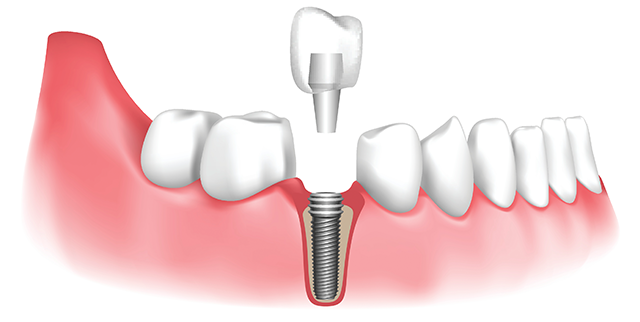
DENTAL IMPLANT

Why Opt for Dental Implants?
A dental implant is an artificial titanium post that replaces the root of your missing tooth. Its purpose is twofold: functional and aesthetic. In most cases, it is the best long-term solution. A dental implant is a way of improving your quality of life and replacing one or more missing teeth permanently and effectively.
Stages of the Placement of a Dental Implant
The first consultation enables us to carry out a detailed assessment of the patient. This enables us to formulate a detailed treatment plan tailored to the patient's situation. In addition, any formal contraindications are eliminated.
A surgical guide is drawn up to ensure optimal results and a complementary radiographic assessment is requested (CT scan or cone beam).
It's surgery day. Implant surgery is performed under local anaesthetic. In rare cases, a general anaesthetic in hospital may be used to carry out the procedure. Thereafter, a period varying typically from three to six months is necessary for the bone to be fused to the implant by the phenomenon ofosseointegration.
Once the healing and osseointegration process is complete, the dentist restores the final prosthesis, whether it is a crown (for the replacement of a single tooth), or a bridge (for the replacement of several teeth).
The Price of Dental Implants:
The price of dental implants varies according to a number of factors, such as the materials used, the reputation of the brand, surgical techniques and the complexity of the procedure. High-quality materials, such as medical titanium, can be more expensive because of their durability and biocompatibility. Well-known brands, committed to research and development, may offer more expensive implants, but often offer a guarantee of quality. Advanced techniques, such as computer-guided surgery, can also influence prices because of their greater precision. Finally, the complexity of the procedure, influenced by factors such as the need for bone grafts or the location of the tooth to be replaced, can also impact on costs. A personalised approach that takes all these factors into account is essential for an informed decision and a successful dental procedure.
How Do You Manage the Aftermath?
The experience of pain varies from one patient to another. Whatever the case, any surgical operation can have the following consequences: Unpleasant sensations, Bleeding, Oedema, Haematomas, and Fever. It is essential to follow the post-operative instructions carefully to avoid any unnecessary pain and to ensure a smooth recovery during this crucial phase.


